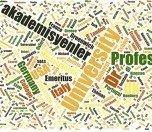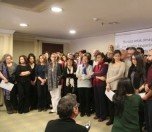Click here to read the article in Turkish / Haberin Türkçesi için buraya tıklayın
The Times Higher Education, the weekly supplement of The Times daily, has issued a letter of support for Academics for Peace Initiative whose petition has been signed by over 500 academics from 20 countries.
The number of supporters for the declaration launched on January 21 by 413 academics from 160 universities and research institutes from 23 countries has reached 693.
Among the signatories, there are celebrated academics such as Massachusetts University – Amherst Chancellor Kumble R. Subbaswamy, Daron Acemoğlu, Gilbert Achcar, Philip Arestis, Michael Ash, Nobel Ekonomi Ödülü sahibi Peter Diamond, Trevor Evans, Maureen Freely, Mary Kaldor, Raphie Kaplinsky, Costas Lapavistas, Marc Lavoie, Deirdre Nansen McCloskey, Katherine Newman, Jose Antonio Ocampo, Esra Özyürek, Robert Pollin, Dani Rodrik, Malcolm Sawyer, Lynne Segal, Tom Stanley, Engelbert Stockhammer and Andrew Watt.
Here is the support letter:
“We are gravely concerned that academics in Turkey are facing a campaign against them, which has been initiated by the Turkish president, for signing a petition. The petition demanded an end to state violence in Kurdish provinces and “a road map that would lead to a lasting peace in Turkey.
“The Turkish judiciary has initiated public prosecution under anti-terror law, alleging ‘terrorist organisation propaganda’. After an emergency meeting, the Higher Education Council decided to commence an investigation against the scholars who signed the petition. These actions represent a violation of freedom of expression in Turkey and are consistent with broader efforts on the part of the Turkish state to punish the critics of state policies.
“Both the Higher Education Council and the individual universities that commenced action against the signatories do not respect academic freedom. We are concerned that cooperation with Turkish universities will be diminished as the credibility of the higher education system is further undermined after numerous attacks on academic freedom in the past.
“We are also concerned that President Erdoğan did not hesitate in describing the petition as an invitation for foreigners to intervene in Turkey. This mindset both reflects and exacerbates the securitisation of the public sphere in Turkey, particularly after the Turkish government’s withdrawal from the peace negotiations with the Kurds. We note that the petition did not call for foreign intervention, but rather for independent observation – which is the hallmark of both human rights monitoring and academic research.
“We, the signatories, are in solidarity with our colleagues in Turkey and call upon the Turkish government to stop the campaign against them. We also call on all governments, the media and the wider public outside Turkey to raise their voice against the curtailment of freedoms and suppression of dissent in Turkey”. (BK/TK)






132.jpg)
kjkkkkkk.jpg)
